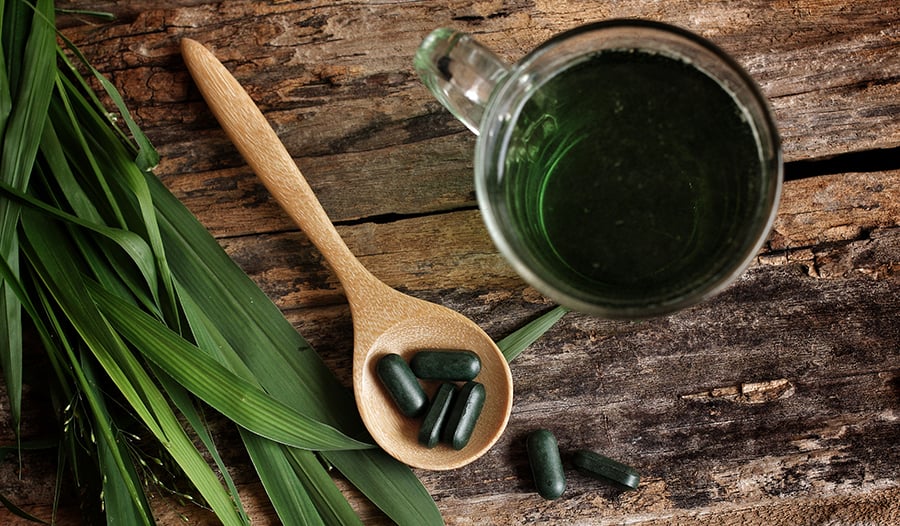What Are Body Deodorizing Supplements? Do They Work?

In today’s hustle and bustle world, staying fresh throughout the day can be challenging. From after-lunch breath to post-workout pits, keeping body odor in check while out and about can be cumbersome.
The Case for Chlorophyll
A new supplement is touted for its body deodorizing qualities that could tackle all your not-so-fresh concerns. While the supplement may be innovative, the main ingredient is an old classic.
Chlorophyll is typically the primary ingredient in body deodorizing supplements. A plant superfood, chlorophyll is a green pigment found in algae, plants, and some bacteria. The name chlorophyll comes from the Greek words chloros (green) and phyllon (leaf). It was first isolated in 1817 by French chemists Joseph Bienaimé Caventou and Pierre-Joseph Pelletier. Abundantly found in green herbs, fruits, and vegetables, chlorophyll plays a crucial role in photosynthesis, or the process of plant cells making energy from the sun. These bioactive molecules exhibit a wide range of beneficial effects in the body, including antioxidant, antimutagenic, antigenotoxic, and anti-obesogenic activities. However, it is unfortunate that leafy materials and fruit peels where chlorophyll is found in abundance often go to waste in the food supply chain.
Consequently, exploring the potential of these discarded resources rich in chlorophyll, such as utilizing them as functional food ingredients, aligns with the principles of a circular economy and presents innovative opportunities for exploitation. One such innovation is chlorophyll-based body deodorizing capsules and liquids. If taken daily, these ‘deodorant pills’, if you will, are believed to reduce body odor significantly and noticeably. The question is, do they really work?
The Benefits of Body Deodorizing Supplements
While many people rave about the ability of body deodorizing supplements to decrease their body odor, limited research backs up these observations. Still, some data help substantiate these claims, which are fresh from the shower.
Chlorophyll and Body Odor
A study found that copper chlorophyllin, a derivative of chlorophyll, has been used to reduce body odor and is believed to neutralize odor-causing compounds. A second study found that chlorophyllin tablets were helpful in controlling body and fecal odors in a group of 62 elderly nursing home residents. It also aided in easing chronic constipation and abating excessive flatus. Considering no negative side effects were observed, body deodorizing tablets could be a viable option for reducing body odor.
A double-blind, placebo-controlled study observed 20 incontinent geriatric patients. Each patient in the study had an indwelling Foley catheter. Each patient received chlorophyllin 100 mg/day for two weeks and a placebo daily for two weeks, separated by a washout period of one week. For each patient, the intensity of urinary odor was measured ten times during both the treatment and placebo regimen and three times during the washout period, using a visual analog scale.
A decrease in urinary odor was attributed to chlorophyllin in 12 patients and to placebo in 6 patients at the end of two weeks on each regimen. Chlorophyllin treatment was associated with approximately a 21% decrease in average urinary odor intensity, whereas placebo increased the odor by about 9%. The average urinary odor intensity was lowest during the second week of chlorophyllin treatment.
These results may support the use of a chlorophyllin-based body deodorizing supplement to decrease body odors, including urine odors.
Other Chlorophyll Benefits
Recent studies have shown that the antioxidant activity of natural chlorophyll derivatives can significantly reduce the effects of some diseases associated with oxidative processes, such as inflammation and oxidative DNA damage.
Another study demonstrated that chlorophyll directly affects and balances the intestinal microbiota in mice. It also suggests that including chlorophyllin in a dog’s diet may be beneficial in preventing intestinal bacterial infections without adversely affecting the growth of good bacteria. These results may also apply to the human gut microbiome. However, more studies are needed.
In vitro studies have shown that chlorophyll is able to fight against different foodborne bacteria and fungi and could even be used as a decontaminating agent for fruits and vegetables, extending their corresponding shelf life.
A formulation based on copper chlorophyll was studied for treating rosacea, a chronic skin condition. The study resulted in favorable clinical outcomes for patients regarding reduced facial redness, a primary symptom of rosacea.
In addition, another study found that chlorophyll extracted from spirulina had high neuroprotective activity. Considering this, it is proposed that chlorophyll may help prevent memory disorders and related diseases.
Parsley
Petroselinum crispum, or garden parsley, is a species of flowering plants in the family Apiaceae that is native to Greece, Morocco, and the former Yugoslavia. Body deodorizing supplements claim that parsley helps to purify your system from the inside out by cleansing key elimination systems within the body, including the liver, bowel, and blood.
Additional benefits of parsley include its antioxidant and free radical scavenging ability. These health benefits are attributed to parsley’s flavonoid content. Flavonoids are anti-inflammatory, anti-ulcer, and have powerful antioxidant properties.
Parsley is also known to be hepatoprotective, brain protective, anti-diabetic, analgesic or pain relieving, spasmolytic, and cytoprotective.
Whether eating it or taking it as an ingredient in body deodorizing supplements, consuming parsley may deliver many health benefits, including reducing body odor.
Mint
This super herb contains vitamins A, B2, and C and minerals like zinc, calcium, copper, and magnesium. Body deodorizing supplements suggest mint will help freshen your body from the inside out.
Peppermint has a broad range of biological benefits, including digestive, choleretic (affecting bile secretion), carminative (relieves flatulence), antiseptic, antibacterial, antiviral, antispasmodic, antioxidant, anti-inflammatory, muscle relaxant, expectorant (helps clear phlegm), analgesic, tonic (increases vigor and wellbeing), and vasodilator (dilates blood vessels).
Considering the health benefits of mint, taking it as a part of your body's deodorizing supplement can have additional benefits beyond odor reduction.
Deodorant Supplements, What You Need to Know
Body deodorizing supplements claim to reduce body odor from within by working to absorb toxins and neutralize odor-causing toxins inside the body before they can be excreted via the breath and skin. Some studies show chlorophyll, the primary ingredient in most of these odor-fighting supplements, may have body odor reduction abilities.
Today, two types of supplemental chlorophyll are available. The first type is chlorophyllin — the human-made version of chlorophyll. There are also supplements made from sodium copper chlorophyllin (SCC), a mixture of sodium copper salts derived from natural chlorophyll.
Both of these come in liquid or pill forms. Chlorophyll supplements are generally taken orally (by mouth). You can also add them to a glass of water or juice. Most chlorophyll supplements will be instructed on how much to take and how often.
Some come in a concentrated version, allowing you to add just a few drops to your drink. If you like to juice or visit a juice bar regularly, you can make a natural liquid chlorophyll drink from parsley or wheatgrass. Feel free to drink it on its own or mix it with other juices that may have a more favorable flavor profile that you enjoy.
The FDA states that adults and children over 12 can safely take 100-200 mg of chlorophyllin daily but should not exceed 300 mg daily.
Chlorophyll-Rich Foods
There are additional sources of chlorophyll beyond supplements, including fresh green herbs, fruits, nuts, and vegetables.
Some examples of these chlorophyll-rich foods to add to your diet include:
- Spinach
- Kale
- Green grapes
- Collard greens
- Broccoli
- Parsley
- Kiwi
- Arugula
- Pistachios
- Green beans
- Chinese cabbage
These vegetables and herbs taste great and give you additional health-boosting vitamins and minerals and the potential body-deodorizing benefits of chlorophyll.
Chlorophyll Cautions and Side Effects
Possible side effects of taking chlorophyll supplements may include:
- Nausea
- Vomiting
- Diarrhea
- Bloating
- Discolored stools
- Teeth staining
You may notice some green teeth staining if you drink your chlorophyll supplement. Do not worry; these are only surface stains. This means you can easily remove the staining with good oral hygiene, including brushing, flossing, and visiting your dentist regularly for checkups.
If you are pregnant or breastfeeding, be sure to ask your doctor about the safety of using chlorophyll since there isn’t data on whether it can be harmful to unborn babies or infants.
The Big Picture
If you want to try this trend, chlorophyll is relatively safe to consume if you stick with the FDA-recommended dosage. It may also help increase water consumption, which has numerous health benefits.
Many studies have shown chlorophyll and other natural ingredients found in body deodorizing supplements can help with odors associated with sweating, bad breath, feces, and urine.
Beyond the odor-reduction quality of these natural substances, chlorophyll, parsley, and mint have a bounty of other health benefits, including antioxidant and anti-inflammatory properties.
Talk to your primary care doctor or a licensed health care professional before adding body deodorizing supplements to your daily routine.
References:
- Martins, T., Barros, A. N., Rosa, E., & Antunes, L. (2023). Enhancing Health Benefits through Chlorophylls and Chlorophyll-Rich Agro-Food: A Comprehensive Review. Molecules (Basel, Switzerland), 28(14), 5344.
- Awosika AO, Anastasopoulou C. Trimethylaminuria. [Updated 2023 Jul 15]. In: StatPearls [Internet]. Treasure Island (FL): StatPearls Publishing; 2024 Jan-.
- Young, R. W., & Beregi, J. S., Jr (1980). Use of chlorophyllin in the care of geriatric patients. Journal of the American Geriatrics Society, 28(1), 46–47.
- Nahata, M. C., Slencsak, C. A., & Kamp, J. (1983). Effect of chlorophyllin on urinary odor in incontinent geriatric patients. Drug intelligence & clinical pharmacy, 17(10), 732–734.
- Sun, D., Wu, S., Li, X., Ge, B., Zhou, C., Yan, X., Ruan, R., & Cheng, P. (2024). The Structure, Functions and Potential Medicinal Effects of Chlorophylls Derived from Microalgae. Marine drugs, 22(2), 65.
- Akıncı, A., Eşrefoğlu, M., Taşlıdere, E., & Ateş, B. (2017). Petroselinum Crispum is Effective in Reducing Stress-Induced Gastric Oxidative Damage. Balkan Medical Journal, 34(1), 53–59.
- Farzaei, M. H., Abbasabadi, Z., Ardekani, M. R., Rahimi, R., & Farzaei, F. (2013). Parsley: a review of ethnopharmacology, phytochemistry and biological activities. Journal of traditional Chinese medicine = Chung i tsa chih ying wen pan, 33(6), 815–826.
- Meamarbashi A. (2014). Instant effects of peppermint essential oil on the physiological parameters and exercise performance. Avicenna journal of phytomedicine, 4(1), 72–78.
DISCLAIMER:This Wellness Hub does not intend to provide diagnosis...
















































































 Table of Contents
Table of Contents















